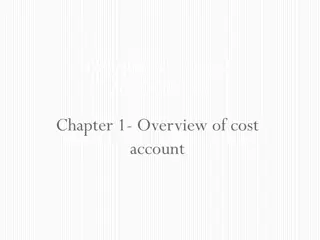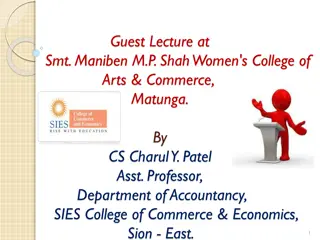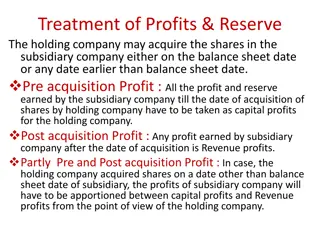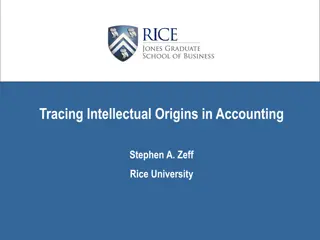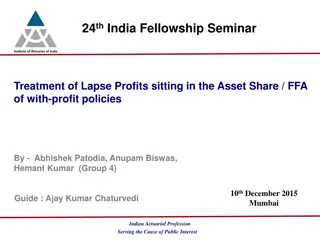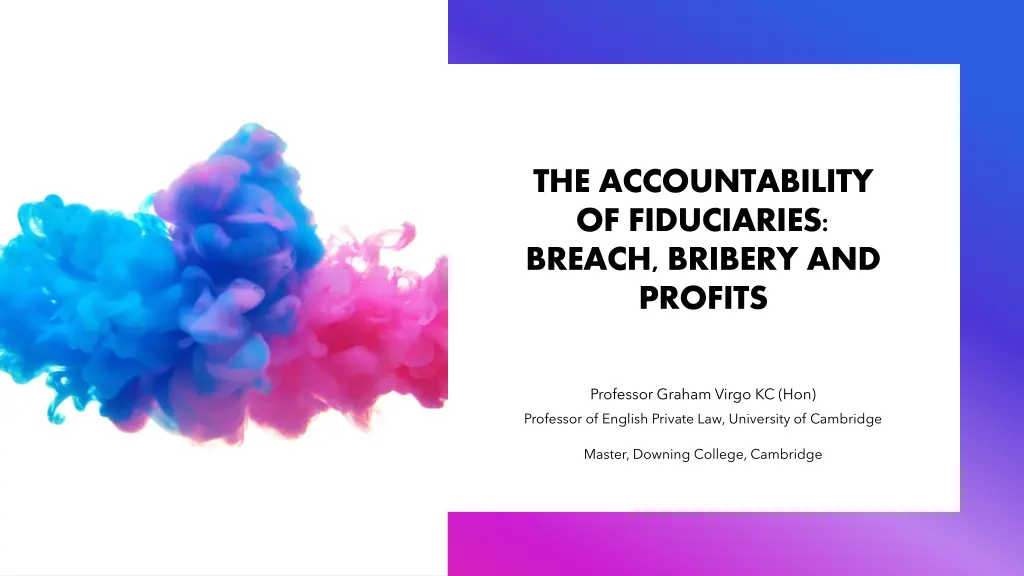
Accountability of Fiduciaries: Definition, Duties, and Case Law Insights
Understand the concept of fiduciaries, their duties, and accountability through case law analysis. Learn how fiduciaries are defined, the nature of their obligations, and key considerations in commercial and non-commercial contexts. Explore the nuances of fiduciary law and the evolving landscape of accountability.
Download Presentation

Please find below an Image/Link to download the presentation.
The content on the website is provided AS IS for your information and personal use only. It may not be sold, licensed, or shared on other websites without obtaining consent from the author. If you encounter any issues during the download, it is possible that the publisher has removed the file from their server.
You are allowed to download the files provided on this website for personal or commercial use, subject to the condition that they are used lawfully. All files are the property of their respective owners.
The content on the website is provided AS IS for your information and personal use only. It may not be sold, licensed, or shared on other websites without obtaining consent from the author.
E N D
Presentation Transcript
THE ACCOUNTABILITY OF FIDUCIARIES: BREACH, BRIBERY AND PROFITS Professor Graham Virgo KC (Hon) Professor of English Private Law, University of Cambridge Master, Downing College, Cambridge
Who is a fiduciary? (i) Defining fiduciaries Fiduciary duties typically arise where one person undertakes and is entrusted with authority to manage the property or affairs of another and to make discretionary decisions on behalf of that person . . . The essential idea is that a person in such a position is not permitted to use their position for their own private advantage but is required to act unselfishly in what they perceive to be the best interests of their principal. Al Neyahan v Kent [2018] EWHC 333 (Comm), [159] (Leggatt LJ)
Who is a fiduciary? (ii) Fiduciaries in a purely commercial context Re Goldcorp Exchange plc [1995] 1 AC 74 English v Dedham Vale Properties Ltd [1978] 1 WLR 93 It is the first importance not to impose fiduciary obligations on parties to a purely commercial relationship who deal with each other at arms length and can be expected to look after their own interests. P Millett, Equity s Place in the Law of Commerce (1998) 114 LQR 214, 217 18
Who is a fiduciary? (iii) Non-fiduciary fiduciary law Wood v Commercial First Business Ltd; Business Mortgage Finance 4 plc v Pengelly [2021] EWCA Civ 471, [2022] Ch 123 Johnson v FirstRand Bank [2024] EWCA Civ 1281 Expert Tooling and Automation Ltd v Engie Power Ltd [2025] EWCA Civ 292 (a) Brokers (1) Fiduciary agents liable for receipt of commission regardless of whether fully or partially undisclosed. (2) Non-fiduciary agent liable for breach of the disinterested duty. (b) Lenders (1) Fully undisclosed commission liable for breach of the disinterested duty. (2) Partially disclosed dishonestly assisting a breach of fiduciary duty.
The nature of accountability Background The rejection of causation when assessing the account Gray v Global Energy Horizons Corp [2020] EWCA Civ, [128] United Pan-Europe Communications NV v Deutsche Bank AG [2000] 2 BCLC 461 Murad v Al-Saraj [2005] EWCA Civ 959 it may be appropriate for a higher court one day to revisit the rule on secret profits and to make it less inflexible in appropriate circumstances, where the unqualified operation of the rule operates particularly harshly and where the result is not compatible with the desire of modern courts to ensure that remedies are proportionate to the justice of the case where this does not conflict with some overriding policy objective of the rule in question. (Arden LJ) Other jurisdictions UVJ v UVH [2020] SGCA 49 Kao Lee and Yip (a firm) v Koo Hoi Yan [2003] 2 HKC 113
Rukhadze v Recovery Partners The facts - The appellants were a director of a company, a partner of a partnership and a solicitor, who owed fiduciary duties to their principals - Asset recovery services were provided by the respondents to a family - The appellants made preparatory steps to contract with the family whilst still working for the respondents, including denigrating the respondents to the family. - The appellants resigned and entered into a contract with the family for recovery services - Trial judge: resignation was in bad faith and occurred to take for themselves a developing business opportunity from the claimants; disloyal; breached duties of confidentiality; but no finding of dishonesty - Liable to account for profits of $179 million subject to a 25% equitable allowance for their work and skill - There was a finding at trial that, had the respondents been awarded the contract, they would very probably have entered into an agreement with the appellants to share the profits equally.
The judgment of Lord Briggs 1. A defendant must account for post-termination profits (made after the fiduciary relationship has ended) if derived from or made out of that former relationship eg learned about opportunity whilst a fiduciary or facilitated by the use of information received whilst a fiduciary: [4]. 2. Recognised a causation analysis but not but for causation. 3. The obligation to account for profits is a distinct duty in itself and not just a remedy. the fiduciary duty to account for profits is a rule governing the conduct of fiduciaries which exists in its own right. It is a duty or obligation imposed by equity on all fiduciaries, as an inherent aspect of their undertaking of single-minded loyalty to their principals. It is not just a discretionary equitable remedy for the breach of some other duty, such as the conflict rule, nor is it necessarily triggered by some other breach, although it very often is. A fiduciary may come to generate a profit out of his role as such without committing any breach of trust. It may be an authorised use of the trust property, or of his fiduciary powers. But he must then account for that profit if it has been made from or out of his fiduciary position, not keep it for himself. The wrong which may lead to a court order for an account of profits is, in such a case, no more or less than the failure to account itself, by a fiduciary who wishes to keep the profit for himself. The duty to account for profits does not depend upon a demand for an account by the principal, or upon an order of the court. There is simply not the relationship between breach and damages for loss caused by the breach which has to be filled by rules as to causation and remoteness which are routinely applied by the common law, and which almost always involve the erection of a counterfactual. [20]
The judgment of Lord Briggs 4. In determining whether the fiduciary is subject to a duty to account for a particular profit there needs to be a link between the fiduciary relationship and that profit. The question is not, would the profit have been made even if there had been no antecedent breach of fiduciary duty, but did the profit owe its existence to a significant extent to the application by the fiduciary of property, information or some other advantage which he enjoyed as a result of his fiduciary position, or from some activity undertaken while he remained a fiduciary which the conflict duty required him to avoid altogether. For that purpose the court looks closely at the facts, ie what actually did happen, but does not concern itself with what might have happened in a hypothetical but for situation which did not in fact occur. [36] 5. So, for example, it is not relevant that the fiduciary would still have made the profit had they asked the principal for their consent. Lord Briggs did not consider that it was appropriate for the court to lay down a precise test of causation, but he accepted that the language of sufficient relationship or nexus were appropriate descriptors of the test: [54].
The judgment of Lord Leggatt 1. Account of profits is a discretionary remedy for breach of fiduciary duty. 2. remedies. Adopts a but for test of causation across the board, for compensatory and disgorgement 3. identify the conduct which constitutes the breach of duty and then to construct a hypothetical scenario in which the defendant s conduct is changed to the minimum extent necessary to achieve compliance with the duty. [206] When determining how this test of causation should apply to the facts it is vital to 4. The core principle: [95]: The fiduciary duty which references to the profit rule obscure is the duty of a trustee or other fiduciary not to use property or any information or opportunity which is to be treated as if it were property of the principal for the fiduciary s own benefit, or indeed for any purpose outside the scope of the fiduciary s authority, unless the principal has given its informed consent. If, in breach of this duty, the fiduciary enters into a transaction which generates a profit, the fiduciary will be liable to account for the profit to the principal.
The judgment of Lord Leggatt 5. I do not share a theory of fiduciary accounting for profits put forward by Lord Briggs. [209] (i) An account of profits is a remedy: a type of order that a court may make in response to a claim in legal proceedings. (ii) Lord Briggs posits another duty to pay profit whenever it is obtained. Does not depend on any claim being made. (iii) This additional duty overcomplicates the law: [215] (iv) Such a duty would be unjust because the fiduciary cannot know without a judicial determination what sum of money, if any, is payable: [216]. (v) Also undermined by the equitable allowance. (vi) A liability rather than a duty: [219]. (vii) Critical of deemed performance being taken literally: [226]. [227]: (Lord Toulson): There is something wrong with a state of the law which makes it necessary to create fairy tales . I would prefer to say: there is nothing wrong with creating fairy tales provided this does not lead you to believe in fairies.
The judgment of Lord Burrows 1. Supported the remedy for wrong analysis but rejected the but for counterfactual test. 2. have been shown in the account. [257]. Account of profits involves seeking a court order for payment of profits that should 3. Accepts that need a causal analysis for compensation for loss and account of profits. 4. fiduciary duty if the fiduciary were allowed to keep unauthorised profit: policy of deterrence to ensure sacrifice of self-interest. No counterfactual causation test because it would undermine the purpose of the
Six outstanding issues 1. The nature of causation (i) What is the test? (ii) Is causation relevant in all cases of account? My acknowledgement that an element of factual causation often plays a part in the identification of profits for which a fiduciary owes a duty to account does not mean that causation, even of this non- but for kind, is a condition for the identification of such profits in every case. Sometimes fiduciaries receive or make profits for which they are plainly accountable, without the need for any causative analysis. For example, a company director who keeps for himself rents paid by a tenant of company-owned property is plainly liable to account to the company. [41](Lord Briggs) (iii) Dishonestly assisting a breach of trust or fiduciary duty Novoship (UK) Ltd v Mikhayluk [2014] EWCA Civ 908: real and effective cause Ancient Order of Foresters in Victoria Friendly Society Ltd v Lifeplan Australia Friendly Society Ltd [2018] HCA 43
Six outstanding issues 2. The nature of accounting The notion that a person has a legal duty to make a payment the amount of which depends upon a future exercise of judicial discretion before that discretion is exercised is not one that I can endorse (Lord Leggatt, [218]) 3. The institutional constructive trust Profits made from the fiduciary relationship are treated by equity as held upon constructive trust for the principal from the moment of their receipt by the fiduciary. In everyday language, the profits belong in equity to the principal and must be treated as such. (Lord Briggs, [2]) 4. The equitable allowance a discretionary way of alleviating the potential injustice of transferring to a beneficiary the whole of the fruit of a fiduciary s hard work and skill (Lord Briggs, [75]) It is unsatisfactory for the law to say that this is all a matter for the discretion of the court depending on the particular facts of the case. (Lord Burrows, [294])
Six outstanding issues 5. Limiting the account Warman v Dwyer (1995) 182 CLR 544 Kao Lee & Yip (a firm) v Koo Hoi Yan [2003] 2HKC 113 Strother v 3464920 Canada Inc [2007] 2 SCR 177 6. Policy I have considered carefully whether in a purely commercial context as the appellants describe it, we should mitigate the effect of the existing rules to reflect the fact that the business world has changed. Are the appellants right to say that the honourable and gentlemanly world of 19thcentury business ethics evoked in the case law if indeed it ever really existed no longer has a place here? (Lady Rose, [319]) Mr Rukhadze has made the same mistake of not appreciating the nature of the responsibilities he took on when, for whatever reason, he accepted appointment as a director of one of the claimant companies. Whether the development and the continued prosperity of the business community in this jurisdiction is helped or hindered by the application of the rules discussed in this case is a broader question which must be tackled by the legislature, if any updating of the rules is needed. (Lady Rose, [335]) The response to the argument that many fiduciaries do not realise that they are in a fiduciary relationship is better public legal education . (Lord Briggs, [53]) Liability can be avoided by making full disclosure to a principal thereby seeking to obtain authorisation for the profits. (Lord Burrows, [286])




